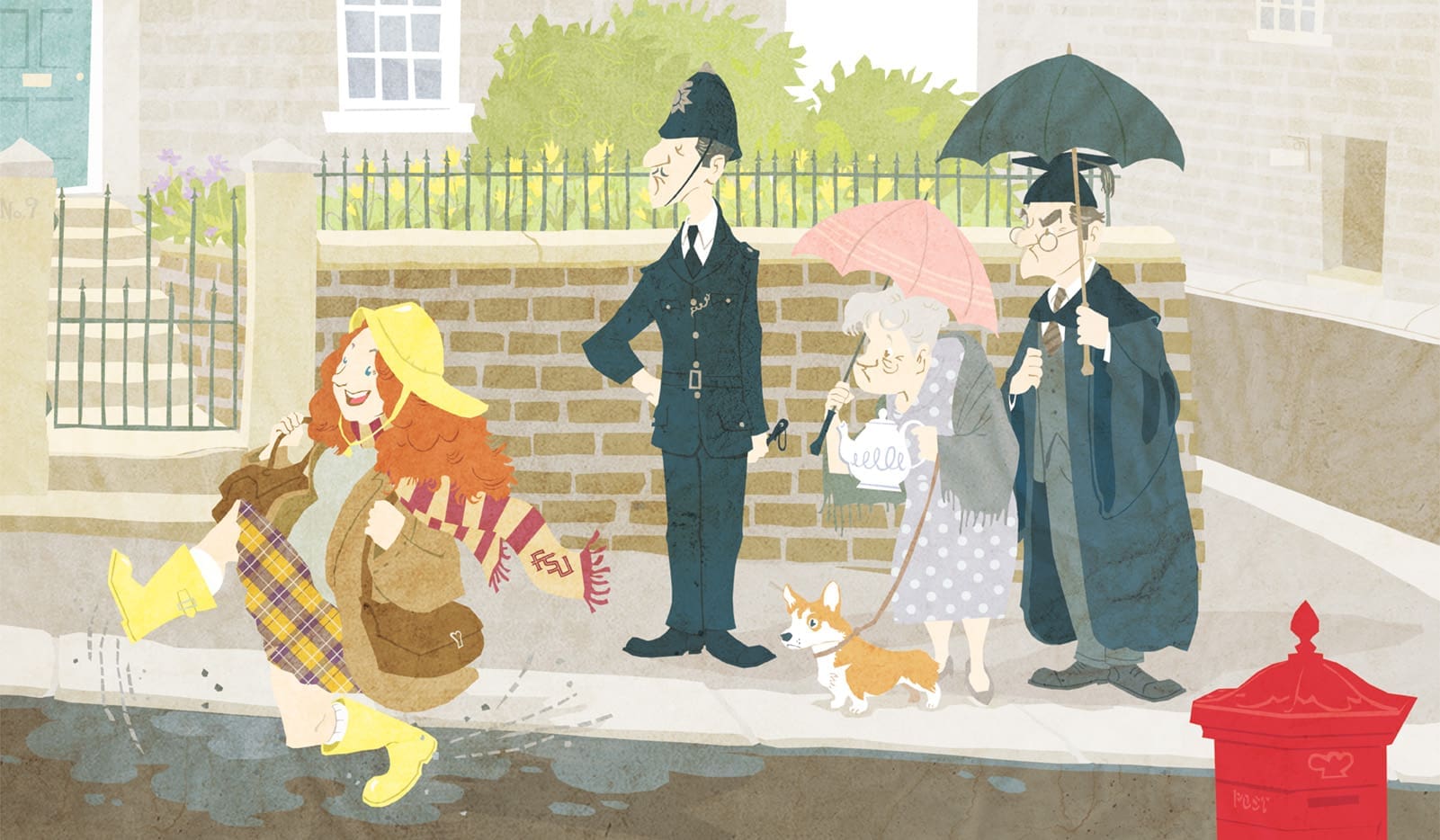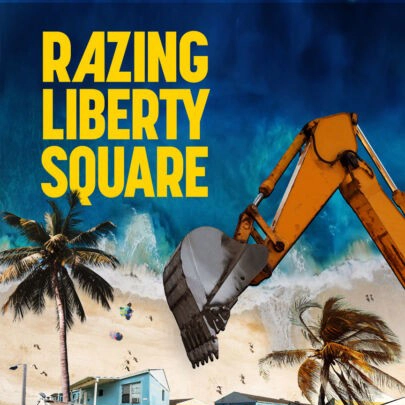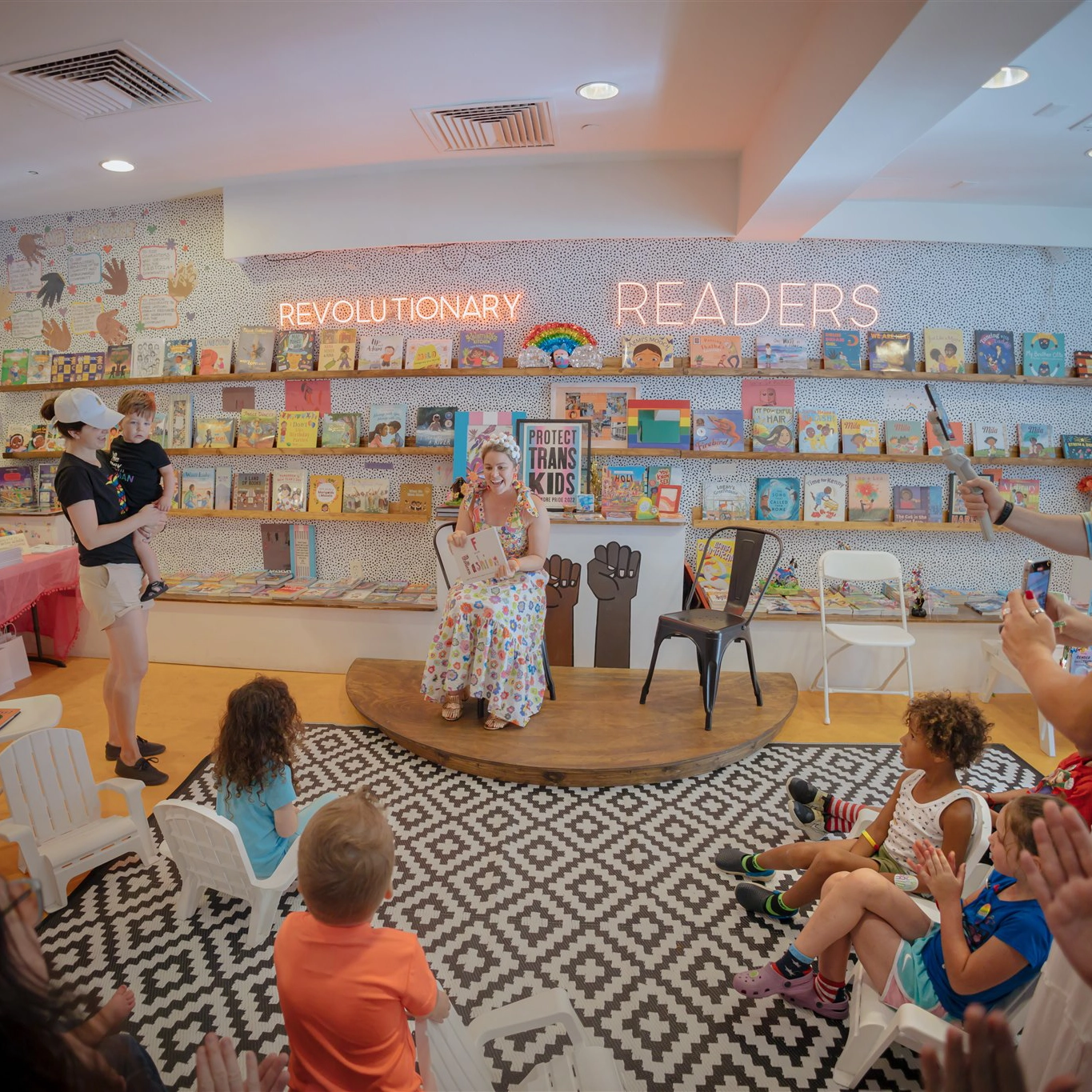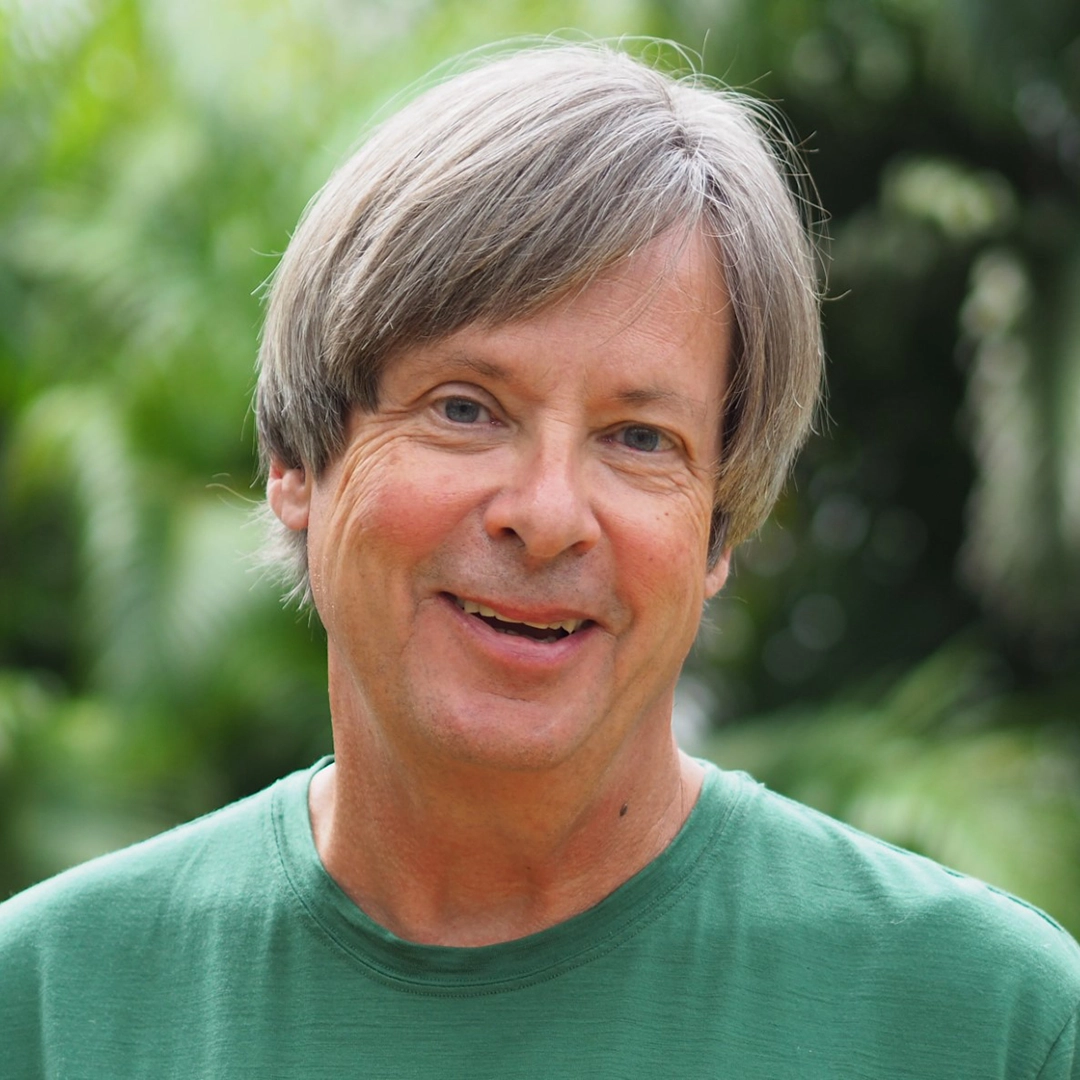by Diane Roberts | July 2, 2018
A True Oxford American
The Tallahassee lassie found connection and comfort in a cold English college that has called her back for 30 years.

BARNARD CASTLE—The crocuses are sticking their pointy purple and gold heads up out of the snow. The daffodils look like they’re hesitating, waiting for a little thaw. It’s very, very cold here—and I love it. My students at Florida State University headed off to Mexico or Daytona for spring break. I got on a plane to cross the pond. They want sea and sun. I want to wear sweaters. Or, given that this is the north of England, a big coat, a woolly scarf, a hat, gloves, two pairs of socks and boots.
You may think it weird that an eighth-generation Floridian likes to freeze. But it’s one reason that, when I came here as a student 30-odd years ago, I took to Britain like a squirrel to a washtub full of mixed nuts. “Hot” to a British person usually means about 72 degrees. I mean, 72 degrees is Tallahassee’s average daytime temperature. In November. Some years, we have to put the air conditioner on at Christmas.
No AC here. No school shootings, no algae in the water, no headlines with the words “president” and “porn star”—not on the front page, anyway—and while there’s a lot about Russian interference in, oh, everything, it still feels therapeutically far from the crazy. Don’t get me wrong: Britain has its own set of issues (Brexit, anyone?) and even its own yellow-haired buffoon, though Foreign Secretary Boris Johnson knows Latin and has been known to read a book, unlike some people I could mention. Anyway, I lived in England from 1980 to 1990, mostly in Oxford, where I did a second bachelor’s and then a D.Phil. at the university—a D.Phil. is the same as a Ph.D., just with the Latin switched around. These days I come back for a spell at least once a year, toggling between Oxford, London and Barnard Castle, this little market town on the River Tees with a vast medieval castle that used to belong to Richard III. You remember Richard, the king they found buried under a parking lot in Leicester? The castle is a ruin, but there’s a museum housed in a faux chateau built by the illegitimate son of an earl to house his wife’s china collection. There’s a good Indian restaurant, a farmers market and seriously nice people. Plus, at the moment, a lot of snow. Barnard Castle lies on roughly the same latitude as Unalaska Island, up in the Bering Sea.
Britain isn’t really like a foreign country to me. I’m not sure it ever was, given the amount of Masterpiece Theatre I consumed. Besides, you know how it is when you’re very young: Wherever you are, whoever you’re with, you get imprinted, kind of like those baby wild turkeys raised by Florida naturalist Joe Hutto. His poults learned to trust a human; I learned to walk on cobblestones in high heels and the correct direction to pass the port decanter.
When I arrived in Britain, the Rhodes and Marshall scholars (I was a Marshall) had an orientation session during which a gaggle of grown people warned us about getting depressed in the winter months, when night falls at 3:30 p.m. and even on a good day the sun looks like a hunk of feebly burning coal in an asphalt-colored sky. We were told that British students could be big drinkers and we shouldn’t try to keep up. We were advised that there was a class system that we, nice, straight-talking American kids, would probably never understand.

I kept waiting to fall prey to misery, drunkenness and social faux pas. But it turns out that I like dark about as much as I like cold. I was in a sorority at FSU, so I was trained in boozing it up, though there’s a difference between chugging beer at the SAE social and getting blotto on good wine and even better single malt whisky. Those hangovers felt like rites of passage. As for the class system, well, if you’ve lived in the South for any amount of time, you will know class divisions ain’t exactly alien to us. The British version did take me a while to figure out, though. My tutorial partner (you are taught individually or in pairs at Oxford) looked as though he didn’t have two pennies to his name. He wore the same ripped jeans and unraveling sweater every day. I told our mutual friend Fiona I was worried about Ed’s apparent destitution. She snorted. “His godfather is the queen’s first cousin,” she said. “And his family predates the Norman Conquest.”
Sure enough, Ed would blossom forth for formal balls in white tie and tails (he owned two tailcoats) and disappear off to some stately home or other for deb parties. He told me later his family had lost its lordly estates during the English Reformation. I could understand that. In the South, we were short on titled gents but not on old, land-poor families who’d show you the silver coffee pot with the ding in the side (courtesy of a Yankee bullet in 1862) or the pearl pin one of the ancestors brought over on the Arbella. Southern white people may have learned the art of inverse snobbery from the British: My mother still insists that shabby furniture and mismatched Limoges left to you by your great-aunt are way better than new stuff you actually buy. Or like.
Like what you read? Subscribe to Flamingo in print.
Even though I had to learn that “pants” means underwear (I still say “trousers,” just to be on the safe side) and that the word “toilet” is never to be uttered, lest you sound declasse (one says “loo”), severe culture shock never hit me. Growing up in a college town in Florida and then moving to a college town in England wasn’t such a revolutionary change, though Oxford does boast some of the finest architecture, most renowned libraries and most important scholars on the planet. Tallahassee has the largest superconducting magnet in the world, plus some nice Greek Revival houses on Calhoun Street.
As for Barnard Castle, well, the north of England is weirdly similar to the south of the United States. People are aggressively friendly. They will insist on feeding you or taking you out to see the nearby Roman bridge or the famous rhododendron garden up the road or that pub in Barningham, the one with the 17 kinds of stout. They’re used to the rest of the country (especially people from London) making fun of what they eat, which includes dainties familiar to my kinfolk, such as head cheese, pigs’ feet and fried everything. They’re accustomed to a certain amount of ridicule for their accents too, a circumstance irritatingly familiar to those of us born below Mr. Mason and Mr. Dixon’s line.
The links between the English north and the American South go way back. I’ve seen the same names in the churchyard in Barnard Castle as in little graveyards in West Florida: Gainer, Nichols, Hodgson, Jordan. Looms in northern England turned American cotton into cloth until the 1860s, when Lancashire millworkers refused to work with cotton picked by slaves. The north was a hotbed of abolitionism. A couple of ladies in Newcastle bought and “freed” Frederick Douglass in 1846; Quakers in Darlington and York sponsored lecture tours for former slaves. I like to think of the north here helping my South become its better self.
I’m not sure this country urges me to a better self—there’s too much really good cheese here and a shop with handmade chocolates. But it’s succor to the soul, a reminder that there’s a world outside America’s periodic fits of madness, a break from the mosquitoes, the political ads on TV, and, most important, the brain-numbing, eyeball-sweating heat.





